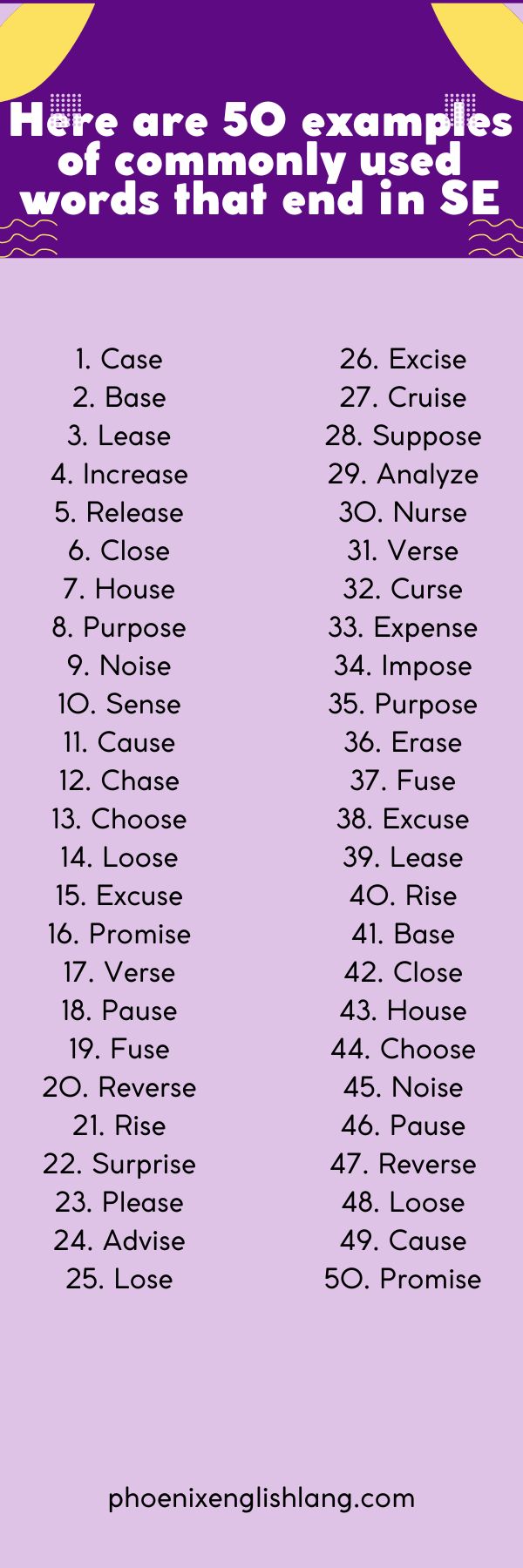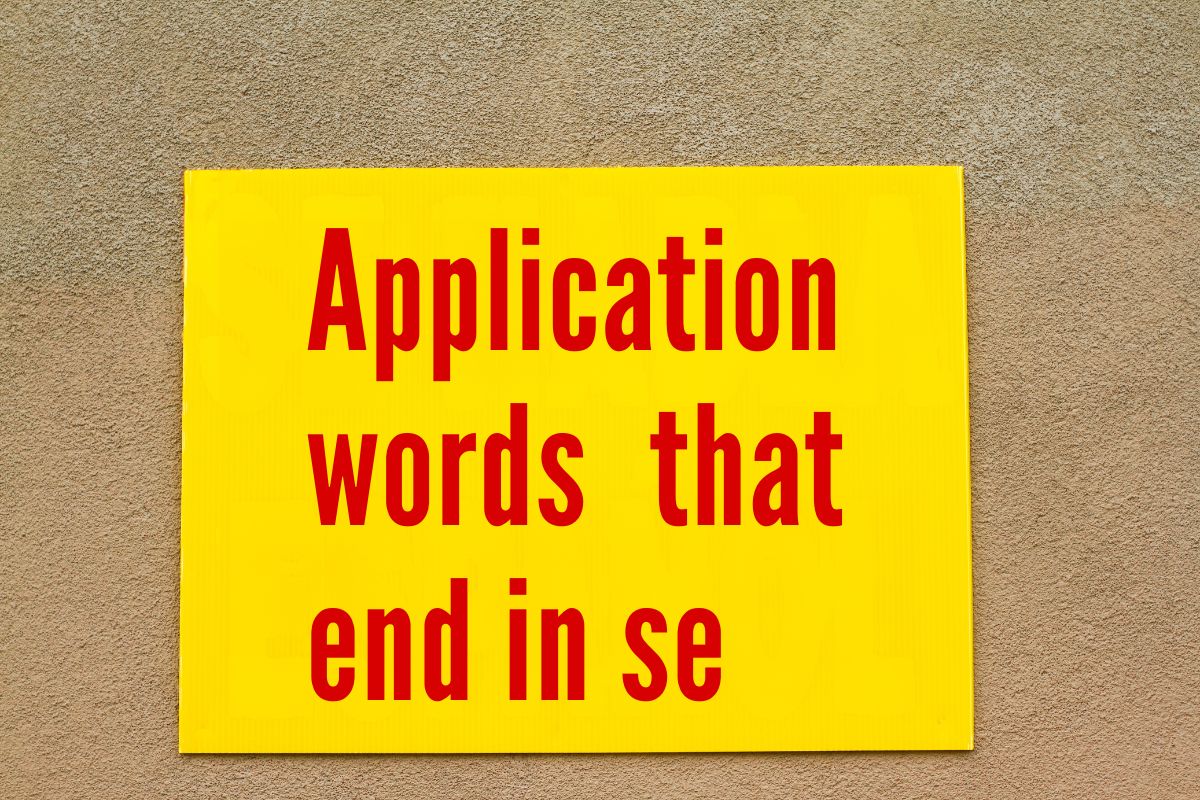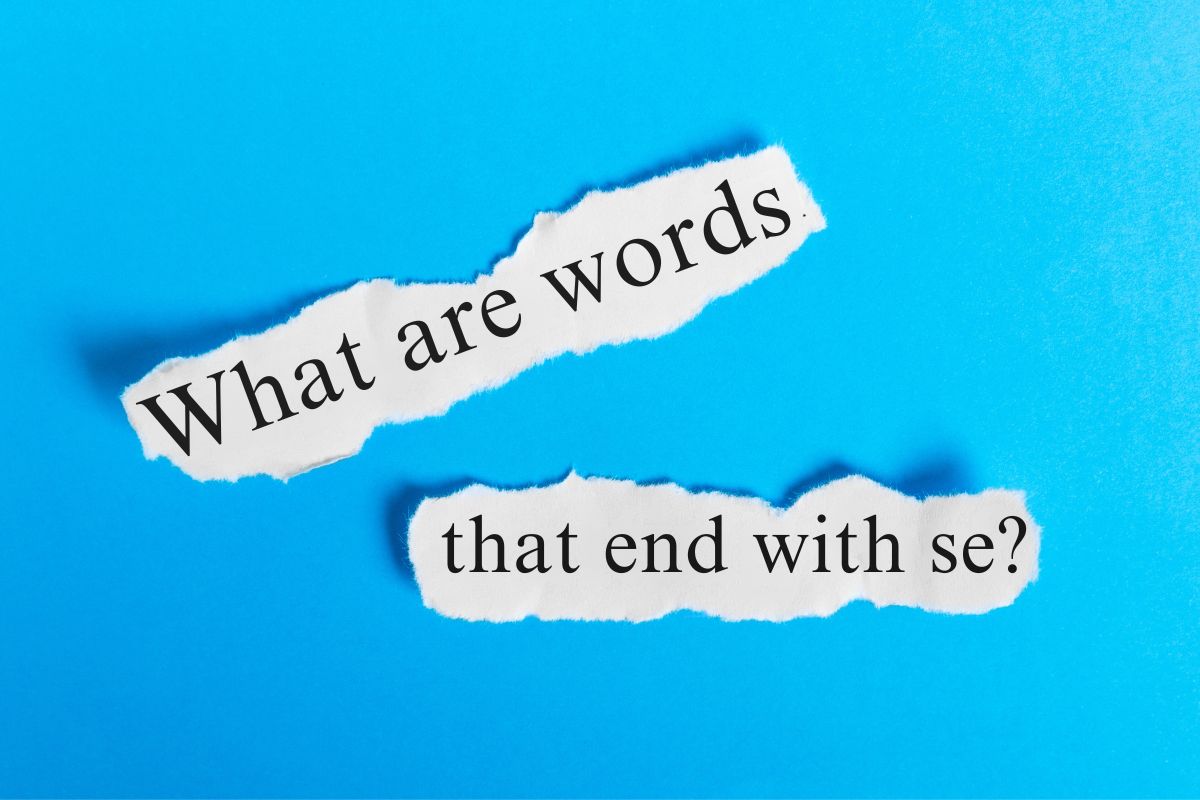Words that end in se are quite common in the English language and can be found in various contexts.
Let me give you some examples of the words that end in “se” for a better vision:
● objectivise
● appulse
● chamise
● confuse
● carboxylase
These words can belong to different parts of speech, including verbs, nouns, adjectives, and adverbs.
Let;s explore some examples and their meanings:
1. Rose: A beautiful flower known for its pleasant fragrance and vibrant colors.
2. Close: To shut or bring something to an end. It can also refer to being near in proximity.
3. House: A building where people live. It can also be used to refer to a specific type of establishment, such as a government house or a guest house.
4. Base: The foundation or lowest part of something. It can also refer to a military station or a starting point.
5. Sense: The ability to perceive or understand something. It can also refer to a particular meaning or feeling.
6. Verse: A division of a poem or song. It can also refer to a line of writing in a religious text.
7. Course: A path or route. It can also refer to a series of educational lessons or a meal.
8. Excuse: A reason or justification for an action. It can also refer to pardoning or forgiving someone.
9. Increase: To make something larger or greater. It can also refer to a rise in quantity or quality.
10. Release: To set something or someone free. It can also refer to the act of making something available to the public.
11. Adverse: Unfavorable or harmful. It can also refer to something that goes against expectations or desires.
12. Promise: A commitment or assurance to do something. It can also refer to a declaration of future success or achievement.
13. Noise: Sound or a loud disturbance. It can also refer to a lack of harmony or clarity.
14. Sense: A feeling or perception. It can also refer to good judgment or common sense.
15. Purpose: The reason or intention behind an action. It can also refer to a desired outcome or goal.
These are just a few examples of words that end in "se." The English language is vast and constantly evolving, so there are many more words to explore.
You might also enjoy: Suggest Vs Recommend: Usage + Examples + Diffrences
Here are 50 examples of commonly used words that end in SE

1. Case
2. Base
3. Lease
4. Increase
5. Release
6. Close
7. House
8. Purpose
9. Noise
10. Sense
11. Cause
12. Chase
13. Choose
14. Loose
15. Excuse
16. Promise
17. Verse
18. Pause
19. Fuse
20. Reverse
21. Rise
22. Surprise
23. Please
24. Advise
25. Lose
26. Excise
27. Cruise
28. Suppose
29. Analyze
30. Nurse
31. Verse
32. Curse
33. Expense
34. Impose
35. Purpose
36. Erase
37. Fuse
38. Excuse
39. Lease
40. Rise
41. Base
42. Close
43. House
44. Choose
45. Noise
46. Pause
47. Reverse
48. Loose
49. Cause
50. Promise
What kind of words end in SE in English?
Words that end in se encompass a diverse array of terms that contribute to the richness of the English language.
From the simplicity of rose to the complexity of precise, these words showcase the versatility of the suffix se.
Whether conveying action, state, or quality, such as in compose or intense, these words add depth and nuance to our expressions.
Exploring this linguistic category reveals not only linguistic patterns but also the intriguing meanings embedded in words like persevere and adverse.
The multitude of words ending in se invites a linguistic exploration, unraveling a tapestry woven with precision and significance.
The suffix -es in words serves various grammatical functions in the English language. Primarily, it isemployed to denote plurality, transforming singular nouns into their plural counterparts.
For instance,box becomes boxes, and wish transforms into wishes. This fundamental usage facilitates clarity and precision in communication.
Moreover, es is a crucial component in forming the third person singular present tense for verbs.
It is appended to the base form of the verb, distinguishing actions carried out by a singular subject. Examples include runs, jumps, and sings, illustrating the versatility of this suffix in expressing ongoing
activities.
Exploring the historical evolution of the "-es" ending unveils the dynamic nature of language. Over time,linguistic shifts and adaptations occur, influencing how words are structured and employed.
This evolution mirrors the cultural and societal changes that shape language, reflecting the collective experiences of a community.
In literature and poetry, the -es suffix contributes to rhythmic patterns and meter. Its incorporation can enhance the musicality of language, creating a harmonious cadence within written or spoken expressions.
Writers often leverage this tool to evoke specific emotions or draw attention to key elements in their works.
In conclusion, the -es suffix is a linguistic cornerstone, playing a pivotal role in pluralizing nouns and crafting verb forms. Beyond its grammatical utility, it carries historical significance, showcasing the evolution of language and its adaptability to societal changes.
As we continue to navigate the intricacies of English, understanding the nuances of suffixes like -es enhances our ability to communicate effectively and appreciate the rich tapestry of language.
At the end of the day, words hold immense power. They have the ability to shape our thoughts,influence our actions, and connect us with one another. However, in todays fast-paced and technology- driven world, it seems that the significance of words is gradually diminishing.
With the rise of social media platforms and instant messaging apps, communication has become increasingly brief and concise.
People often resort to abbreviations, acronyms, and emojis to express their thoughts and emotions. While this may seem convenient and efficient, it can also lead to a loss of
depth and meaning in our conversations.
In addition, the prevalence of visual content, such as photos and videos, has taken the spotlight away from written words.
Platforms like Instagram and TikTok have made it easier for individuals to share their experiences and stories through visuals rather than through written narratives.
While visuals canbe captivating and engaging, they lack the nuance and subtlety that words can provide.Furthermore, the rise of artificial intelligence and voice assistants has changed the way we interact with words.
We now have the ability to ask questions and receive instant answers without having to type or read anything. While this technology has undoubtedly made our lives more convenient, it has also contributed to a decrease in our reliance on words as a means of communication.
However, despite these changes, words still hold immense value and importance. They are the building blocks of language, the means through which we express our thoughts, emotions, and ideas.
Words have the power to inspire, educate, and bring about change. They can create connections, bridge gaps, and foster understanding between individuals from different backgrounds and cultures.
Moreover, words are not limited to just written or spoken form. They can also be expressed through art, music, and poetry.
Artists and musicians use words to convey their emotions and experiences, creating works that resonate with audiences on a deep and personal level.
In conclusion, while it may seem that words are losing their significance in todays digital age, they still play a vital role in our lives.
They have the power to shape our thoughts, connect us with one another, and inspire us to take action. It is important for us to recognize and appreciate the power of words, and to use them wisely and thoughtfully in our interactions with others.
You might also enjoy: AI and English Learning: Is this the end of English classrooms?
Application words that end in se

Here are some application-related words that end in "se":
1. Analyze: To examine something in detail in order to understand it better or make informed decisions.
2. Compose: To create or write something, such as a document, music, or a message.
3. Organize: To arrange or structure something in a systematic or orderly manner.
4. Visualize: To form a mental image or picture of something in your mind.
5. Supervise: To oversee or manage a process, activity, or group of people.
6. Realize: To become aware of or understand something, often after a period of time or reflection.
7. Advise: To offer suggestions, recommendations, or guidance to someone.
8. Appraise: To assess or evaluate the value, quality, or condition of something.
9. Recognize: To identify or acknowledge someone or something as being familiar or known.
10. Comprise: To consist of or be made up of various parts or elements.
These words can be used in the context of different applications, such as software development, project
management, data analysis, or communication.
Words Ending in SE
Numerous words ending in se find application in various contexts. For instance, release pertains to setting something free, while adverse describes an unfavorable condition.
In a technological context, browse signifies exploring content, and in music, verse denotes a section of a song or poem. Business and finance incorporate terms like purchase and expense, highlighting transactions and costs.
The versatility of words ending in se extends to communication, with words like discourse representing spoken or written expression. These examples illustrate how words with this suffix play pivotal roles across diverse applications in language and communication.
At the end of every journey, there lies a moment of reflection and introspection. This is where words come into play, serving as the bridge between our experiences and the application of what we have learned.
Throughout our lives, we accumulate knowledge, skills, and wisdom. However, without the ability to articulate and express these insights, they remain dormant within us.
It is through words that we are able to share our experiences, convey our thoughts, and inspire others. In the realm of education, words are essential for the application of knowledge.
They allow us to communicate our understanding of various subjects, whether it be through essays, presentations, or discussions.
Through the power of words, we are able to demonstrate our comprehension and critical thinking abilities, showcasing the practical application of what we have learned.
Furthermore, in professional settings, words serve as a tool for effective communication. Whether it is in writing reports, giving presentations, or engaging in conversations, the ability to articulate ideas clearly and concisely is crucial.
Words enable us to convey our expertise, persuade others, and collaborate effectively. They are the foundation upon which successful teamwork and innovation are built.
In personal relationships, words play a vital role in expressing our emotions, thoughts, and intentions.
They allow us to connect with others on a deeper level, fostering understanding, empathy, and intimacy. Words have the power to heal, inspire, and strengthen relationships, as well as to resolve conflicts and bridge gaps in communication.
Moreover, words are not limited to spoken or written form. In the digital age, words have found new avenues of application through social media, blogs, and online platforms.
They have become a means of self-expression, activism, and community-building. Through the power of words, individuals are able to
share their stories, advocate for causes they believe in, and connect with like-minded individuals across the globe. Words are not just the end of an essay or a conversation, but rather the beginning of a new chapter.
They hold the power to apply our knowledge, communicate effectively, build relationships, and make a positive impact on the world.
It is through the application of words that we are able to transform our experiences into meaningful actions and create a lasting impact on those around us.
What are words that end with se?

Here are some words that end with se
1. House
2. Mouse
3. Horse
4. Close
5. Loose
6. Fuse
7. Base
8. Case
9. Promise
10. Exercise
These are just a few examples, and there are many more words that end with se in the English language.
What words have the letters se?
Several words contain the letters se Here are a few examples
1. Sense
2. Case
3. Base
4. Lose
5. These
6. Wise
7. Horse
8. Rose
9. Chase
10. Desire
These are just a handful of words, and there are many more possibilities in the English language.
Exploring the Power of Words Ending in se

Words are the building blocks of communication, and as students, developing a strong vocabulary is essential for effective expression.
One fascinating group of words are those that end in se From verbs to nouns, adjectives, and adverbs, these words hold the power to convey meaning, describe actions, and
capture emotions.
In this essay, we will explore the significance and usage of words that end in se and how students can benefit from incorporating them into their language repertoire.
You might also enjoy: Full List of Words That End in “Less”
1. Verbs – Action in Motion
Words that end in "se" often function as verbs, denoting actions or states. Take, for example, the word exercise Regular exercise is vital for maintaining a healthy lifestyle.
It refers to physical activities that promote fitness and well-being, such as jogging, swimming, or yoga. By incorporating exercise into our daily routine, students can boost their energy levels, enhance concentration, and alleviate stress.
2. Nouns – Objects and Concepts
Moving beyond verbs, words that end in se can also act as nouns, representing objects or abstract concepts. Consider the word purpose.
As students, having a clear sense of purpose is essential for motivation and direction.
It is the driving force that propels us forward, whether in academics,extracurricular activities, or personal aspirations.
By identifying our purpose, we can set meaningful goals, prioritize our efforts, and achieve success.
3. Adjectives – Describing the World
In addition to verbs and nouns, words ending in se can function as adjectives, painting vivid pictures and describing the world around us.
Take, for instance, the word diverse. Our world is a tapestry of diverse cultures, beliefs, and perspectives.
Embracing diversity fosters inclusivity, empathy, and understanding. By appreciating and respecting diversity, students can broaden their horizons, challenge stereotypes, and create harmonious communities.
4. Adverbs – Modifying Actions
Words ending in se can also act as adverbs, modifying verbs and adding nuance to actions. Consider the word carefully. When studying or completing assignments, approaching tasks carefully ensures
accuracy and attention to detail.
By working carefully, students can avoid errors, produce high-quality work, and demonstrate their dedication to excellence.
Words that end in se hold great significance and value for students. Whether as verbs, nouns, adjectives, or adverbs, these words allow students to express themselves more effectively and precisely.
By incorporating words like exercise, purpose, diverse and carefully into their vocabulary,students can enhance their communication skills, articulate their thoughts with clarity, and engage in meaningful conversations.
So, let us embrace the power of words that end in se and unlock the full potential of our language.Remember, expanding your vocabulary is a continuous journey.
Keep exploring new words, their meanings, and their applications to become a more confident and articulate communicator.
Words that culminate with the distinctive se suffix offer students an intriguing exploration into the linguistic landscape of the English language.
These words, spanning a multitude of categories, contribute to the vivid tapestry of expression.
In the realm of action, students encounter words like compose and improvise illustrating the act of creating and adapting.
Understanding such words not only enriches vocabulary but also empowers students to articulate their thoughts with precision.
Exploring words like verse in literature exposes students to the poetic nuances of language. The concept of a verse, be it in a song or a poem, becomes a gateway to appreciating the rhythmic beauty embedded in written and spoken forms.
In science and nature, the se ending is found in words like release and disperse. These terms encapsulate processes crucial to understanding natural phenomena and scientific principles, providing students with a foundation for comprehending complex concepts.
The suffix also contributes to words conveying states or conditions, as seen in "adverse" and intense. These terms offer a nuanced understanding of situations and emotions, encouraging students to express themselves with nuance and accuracy.
Moreover, practical applications emerge in words like purchase and lease, essential for students navigating economic and financial literacy.
The distinction between these words becomes pivotal in grasping economic transactions and contractual agreements.
Words concluding with se form a diverse linguistic cohort that not only broadens vocabulary but also facilitates a deeper comprehension of actions, states, and qualities.
This exploration is not just a linguistic exercise but a journey into the essence of expression across various disciplines, providing students with a comprehensive toolkit for effective communication and comprehension.
You might also enjoy: Top 30 Words That End With “Ful”
5 letter words ending in SE second letter A
Here are some five-letter words that end in se with the second letter being a
1. Chase
2. Gause
3. Marse
4. Parse
5. Rapse
6. Valse
These are just a few examples, and there may be other five-letter words that fit the given criteria.
Words are like little puzzles that help us express our thoughts and feelings. Today, let;s dive into the magical world of words that end in se!
One exciting word is horse. Can you imagine the majestic gallop of a horse? These incredible animals have been our companions for centuries, making our world a bit more adventurous. Next up, we have rose. Picture a garden filled with colorful roses – red, pink, and yellow.
These
beautiful flowers not only look stunning but also carry a sweet fragrance that makes the air delightful. Now, let;s talk about verse. Verses are like musical notes for words, creating rhythm and poetry.
They make stories and songs come alive, adding a touch of magic to our language. Another fantastic word is;universe. Its like a giant puzzle of stars, planets, and galaxies.
Exploring the universe sparks our curiosity and opens up endless possibilities for discovery. Moving on to nurse.
Nurses are superheroes in scrubs, taking care of us when we;re not feeling well.
Their kindness and care make the world a better place. Lastly, we have excuse.
Sometimes, we need to say sorry or explain ourselves. Excuses help us express our feelings and mend things when mistakes happen.
So, whether it;s the speed of a horse, the beauty of a rose, the rhythm of a verse, the vastness of the universe, the kindness of a nurse, or the need for an excuse – words that end in se add flavor and excitement to our language.
Keep exploring the world of words, and you;ll discover endless wonders!
History of Words that End in SE

1. Etymology: Many English words ending in se derive from Latin, where the suffix -se often indicated a verb form.
2. Middle English Influence: During the Middle English period, many French words entering English also ended in -se, further popularizing this ending.
3. Common Verbs: English verbs such as rise, choose, and lose are examples of common words ending in se.
4. Latin Roots: The Latin verb “tradere” (to deliver) has led to words like “trade” and “traduce,” showcasing the Latin influence on English.
5. Adaptation of Romance Languages: The suffix -se is prevalent in various Romance languages, which influenced the development of English vocabulary.
6. Middle Ages: In medieval English texts, many words ending in se emerged, often used in legal or religious contexts.
7. Phonetic Evolution: The pronunciation of words ending in se has evolved over centuries, affecting their modern usage.
8. Borrowed Terms: Words like facade from French have added to the number of words with the “se” ending in English.
9. Scientific Vocabulary: In scientific language, ase is often a suffix denoting enzymes, showing the evolution of technical vocabulary.
10. Poetic Usage: Many poets have favored “se” ending words for their rhythmic qualities.
11. Noun Forms: The transition from verbs to nouns ending in se, such as purpose, illustrates language dynamics.
12. Idiomatic Expressions: Many phrases in English incorporate se words, such as take a chance or make do.
13. Spelling Variants: Some words have alternate spellings that affect their meaning, such as phase vs. phaze.
14. Homophones: Several words end with “se” that sound alike but have different meanings, like sell and cell.
15. Cognates: Several cognates in different languages share the se ending, highlighting linguistic connections.
16. Historical Texts: The appearance of se words in historical manuscripts provides insight into language evolution.
17. Derivative Formation: Many se words can form derivatives by adding prefixes or suffixes, e.g., surprise from prise.
18. Language Borrowing: The incorporation of “se” ending words into English from Germanic and Celtic languages demonstrates linguistic borrowing.
19. Changing Usage: Historically, some se ending words have shifted in function, often changing from transitive to intransitive forms.⌨️
20. Slang Developments: Urban slang often adapts or reinterprets traditional se ending words, generating new meanings.
21. Cultural References: Many se words are featured in cultural works, influencing their recognition and usage.
22. Global Influence: The spread of English worldwide has introduced regional variations of se ending words.
23. Semantic Shifts: Some se ending words have taken on new meanings over time, adapting to contemporary contexts.
24. Syllable Stress: The stress patterns in pronunciation of se ending words can vary by dialect (e.g., British vs. American English).
25. Vocabulary Expansion: The ongoing creation of new se words, particularly in technology and science, reflects language expansion.
26. Educational Resources: Many English language educational materials emphasize learning se ending words for vocabulary development.
27. Artistic and Literary Use: Writers often select words ending in se for their thematic resonance in poetry and prose.
28. Morphological Variation: The presence of prefixes and other modifiers affects how “se” words are understood morphologically.
29. Cognates in Other Languages: Parallel developments in other languages regarding “se” words showcase universal trends in language.
30. Continued Relevance: The relevance of “se” ending words persists as they remain integral to both everyday language and specialized contexts.
These words refer to women in various roles or positions, and the "-es" suffix is often used to indicate
the feminine form or title.

Hi, welcome to my blog! My name is Omid and I am thrilled to have you here! I am an English language teacher with 12 years of experience and hold multiple international certifications (TESOL, IELTS, TOEFL, PTE, CELTA). Additionally, I hold a PhD in Applied Linguistics with a specialization in Teaching English as a Second Language (TESL), which fuels my passion for teaching English and assisting others in mastering the language. To me, nothing is more rewarding than helping individuals enhance their English language abilities through various methods. So, let’s embark on this journey of learning English together.




